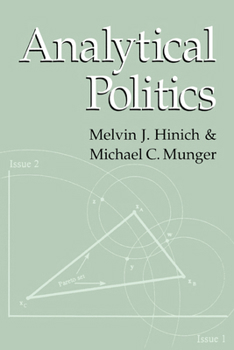Analytical Politics
Select Format
Select Condition 
Book Overview
Analytical Politics is an introduction to analytical theories of politics, explicitly designed both for the interested professional and classes in political science. We cannot evaluate how well governments perform without some baseline for comparison: What should governments be doing? This book focuses on the role of the center in politics, drawing from the classical political theories of Aristotle, Hobbes, Rousseau, and others. The main questions...
Format:Paperback
Language:English
ISBN:0521565677
ISBN13:9780521565677
Release Date:April 1997
Publisher:Cambridge University Press
Length:268 Pages
Weight:0.85 lbs.
Dimensions:0.8" x 6.0" x 9.0"
Customer Reviews
2 ratings
Excellent book, but needs exogenous motivation
Published by Thriftbooks.com User , 16 years ago
This textbook by two of the leading scholars in the field of political science is extremely useful for anyone who has a serious interest in politics (which includes not only mass politics, but also board-room or department-level politics). Not surprisingly, after more than 10 years since its publication, it is still a "must read" for all students of politics. Its only serious competitor is the textbook by Shepsle and Bonschek (also 1997), which is broader in scope but also easier and a bit more superficial. Reading this book helps you understand a lot of news-making and other everyday events. That is, there is a "positive" side that covers many of the core theorems of political science. At the same time, (and perhaps more significantly, especially for specialists) it also helps you understand the limits in our understanding of such events (e.g. how the Median Voter Theorem is not like peanut-butter: it should not be spread thinly over any surface). That is, there is a "negative" side that really gives you a feeling of the limitations of our knowledge and of new research opportunities (NB. The field has progressed a bit since 1997, though not too much. For updates, search both political-science and economics journals.) The main strength of the book is that it proves that a lot of the "science" part in political science lies with theory. Naive uses of quantitative techniques or qualitative-imitating-quantitative techniques will just not do. That is because anyone who does not get familiar with the theory before testing hypotheses risks missing a huge lot that we already know. So, forget KKV's aphorisms about "the science being the method" and prepare to load some brain-cells with theory. The main weaknesses that I see in this book are two (minor ones): (1) It is not sufficiently motivated. Don't get me wrong: the authors do try to transmit a feeling for the importance of their topic, and they do use examples (some of them quite funny). But my impression is that these will do only for those who have already decided to spend the time and effort reading this book. If a new edition is planned, it should be made a bit more proselytising. (2) The exercises are a bit "dry". That makes them more generalisable, but also more boring to solve.
An Excellent Undergradute Level Textbook
Published by Thriftbooks.com User , 22 years ago
Hinich and Munger's work is a useful introduction to the field. They explain certain basic concepts like the Median Voter Theorem at the outset of the work and then they elaborate and expand the coverage slightly. Besides being an introductory textbook, it also explains for everyone the dynamics of modern political decision-making. It offers an invaluable insight to the processes by which decisions are made and they are well argued. The fact that at the end of the book, there is a section which explains the areas that need further research is also beneficial. A well-balanced, informative book on Political Science.





